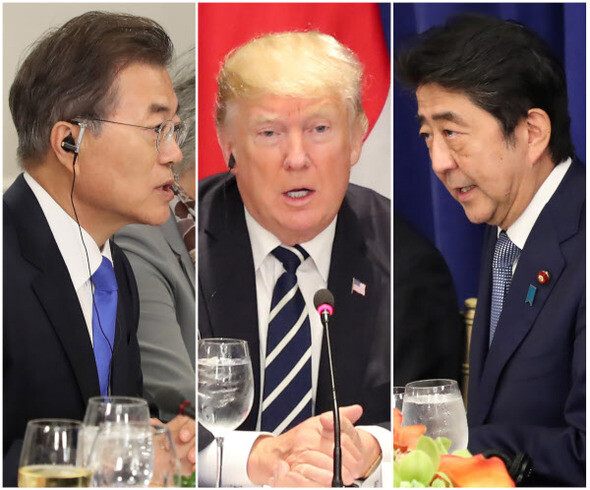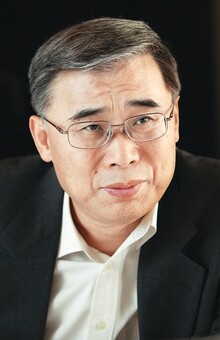hankyoreh
Links to other country sites 다른 나라 사이트 링크
[Column] “Three no’s” policy reinforces South Korea’s sovereignty

After the Moon Jae-in administration’s pledge to adopt assertive diplomacy and a leading role on Korean Peninsula issues, it was extremely painful to witness how badly its diplomatic efforts seemed to go awry. Finally, there has been some good news to relieve the congestion: South Korea and China had agreed to put the THAAD issue to bed and go to work on restoring their relationship and putting it on a normal development track. Given how much of a negative impact THAAD had had on South Korea’s economy, foreign affairs, and national security, this was fortunate indeed.
But now there is some debate raging over the “three no’s” announced by the administration in connection with the THAAD agreement. The ones stirring the pot there are chiefly conservative political parties and certain figures from the South Korean conservative press and US government. The gist of their criticism is that the three no’s amount to bowing to Chinese pressure and forfeiting South Korea’s security sovereignty. As a critique, this is absurd.
The three no’s include significant content regarding South Korea’s sovereignty. The “forfeiting sovereignty” charges might have some merit had these principles been something the Moon administration did not want, but was forced to announce under unilateral pressure from China. As far as I’m aware, however, the three no’s are part of a vision and strategy Moon has been pursuing since his candidacy in the presidential election.
The first of the three, in which Seoul ruled out additional THAAD deployments, was most probably a position Moon already firmly held. Early on, Moon preferred a Korean model of missile defense system, holding a dim view of the THAAD deployment in terms of its military efficacy and potential negative impact on the South Korean economy and northeast Asian political situation. During his candidacy, he shifted to a stance of “strategic ambiguity,” presumably because of its practical status as an agreement between the South Korean and US government and divisions in public opinion.
After taking office, he made the controversial decision to deploy one THAAD battery, but ended up paying a fairly stiff price in terms of societal conflict and economic and security costs. It was expected that the administration, having gone through this painful experience, would at some point try to head off a potential repeat of this nightmare by announcing far and wide that it was ruling out additional deployments.
South Korea’s nonparticipation in the US-led missile system also falls in line with Moon’s own position, as it’s something he has voiced to the US since the Kim Dae-jung and Roh Moo-hyun administrations, based on consideration of its military efficacy and various strategic factors. In terms of the administration declaring that trilateral security cooperation with the US and Japan “will not develop into a military alliance,” Moon has already stated on several occasions here and abroad that while South Korea and the US have a firm alliance, alliances with the US and Japan or with Japan alone are out of the question.
Some have argued that Japan’s military strength is needed to counter North Korea’s nuclear capabilities, but this is merely an attempt to advocate for Japan’s development into a military power. Realistically, the combined military capabilities of South Korea and the US are enough.
In this sense, the three no’s may be seen not as the forfeiting of sovereignty, but as the Moon administration’s way of giving Beijing a face-saving way out of the THAAD issue, while taking advantage of the opportunity to actively declare his commitment to the kind of balanced diplomacy he’d briefly been wavering on. They certainly do express the Moon administration’s commitment to shutting down elements to Korean Peninsula issues that might precipitate a race for dominance in northeast Asia.
Since they run counter to Washington’s attempts to bring Seoul on board in curbing Beijing, they also read as a commitment not to simply follow blindly with US President Donald Trump’s policies, which are all about dividing northeast Asia up into “sides.” As if to drive this point home, Moon said in a recent interview with the foreign press that he planned to pursue “balanced diplomacy with both the US and China,” while declaring a trilateral military alliance with the US and Japan “inappropriate.”
Now the key questions are the administration’s level of commitment and drive. It is certain to face domestic and overseas challenges in the near future that threaten to undermine its commitment to the three no’s. Only by meeting those challenges can the South Korean government usher in an era of balanced diplomacy where it plays an active role in Northeast Asia.

The first hurdle is already emerging with Trump’s arrival tomorrow in South Korea. On the eve of his meeting with this difficult customer – a rigid unilateralist who talks of war on the Korean Peninsula – Moon stressed the importance of a peaceful resolution in a meeting with the NATO Secretary General, noting the risks of military action and observing that Seoul’s distance of less than 45 km from the DMZ means it could face devastation at the hands of conventional weaponry rather than nuclear weapons or long-range missiles. He also clearly stated his position on balanced diplomacy. There’s a sense of resolution to his actions as President – which are hopefully the result of reflection on the last six months of foreign policy.
As difficult as it is, I encourage Moon to stick firmly to his balanced diplomacy stance and stress the unacceptability of military action to Trump, keeping the trademark smile on his face while showing a will of steel – sharing, as he did with the NATO Secretary General, the dangerous situation faced by the more than 20 million South Koreans living just below the DMZ.
By Lee Jong-seok, former Unification Minister in the Roh Moo-hyun administration and Senior Research Fellow at the Sejong Institute
Please direct questions or comments to [english@hani.co.kr]

Editorial・opinion
![[Column] Park Geun-hye déjà vu in Yoon Suk-yeol [Column] Park Geun-hye déjà vu in Yoon Suk-yeol](https://flexible.img.hani.co.kr/flexible/normal/500/300/imgdb/original/2024/0424/651713945113788.jpg) [Column] Park Geun-hye déjà vu in Yoon Suk-yeol
[Column] Park Geun-hye déjà vu in Yoon Suk-yeol![[Editorial] New weight of N. Korea’s nuclear threats makes dialogue all the more urgent [Editorial] New weight of N. Korea’s nuclear threats makes dialogue all the more urgent](https://flexible.img.hani.co.kr/flexible/normal/500/300/imgdb/original/2024/0424/7317139454662664.jpg) [Editorial] New weight of N. Korea’s nuclear threats makes dialogue all the more urgent
[Editorial] New weight of N. Korea’s nuclear threats makes dialogue all the more urgent- [Guest essay] The real reason Korea’s new right wants to dub Rhee a founding father
- [Column] ‘Choson’: Is it time we start referring to N. Korea in its own terms?
- [Editorial] Japan’s rewriting of history with Korea has gone too far
- [Column] The president’s questionable capacity for dialogue
- [Column] Are chaebol firms just pizza pies for families to divvy up as they please?
- [Column] Has Korea, too, crossed the Rubicon on China?
- [Correspondent’s column] In Japan’s alliance with US, echoes of its past alliances with UK
- [Editorial] Does Yoon think the Korean public is wrong?
Most viewed articles
- 1[Column] Park Geun-hye déjà vu in Yoon Suk-yeol
- 2Thursday to mark start of resignations by senior doctors amid standoff with government
- 3N. Korean hackers breached 10 defense contractors in South for months, police say
- 4[Editorial] New weight of N. Korea’s nuclear threats makes dialogue all the more urgent
- 5Will NewJeans end up collateral damage in internal feud at K-pop juggernaut Hybe?
- 6Kim Jong-un expressed ‘satisfaction’ with nuclear counterstrike drill directed at South
- 7[Editorial] Japan’s rewriting of history with Korea has gone too far
- 8[Column] ‘Choson’: Is it time we start referring to N. Korea in its own terms?
- 9[Cine feature] A new shift in the Korean film investment and distribution market
- 10[Column] The clock is ticking for Korea’s first lady